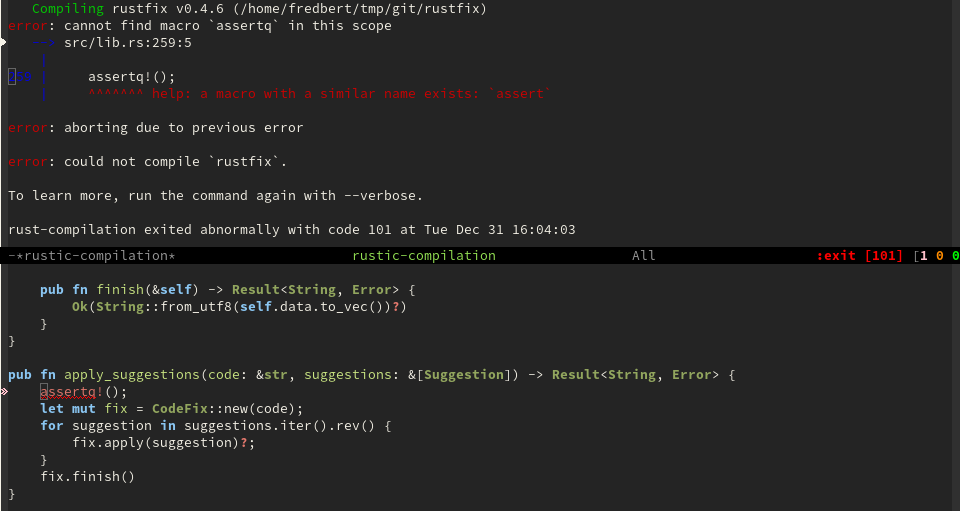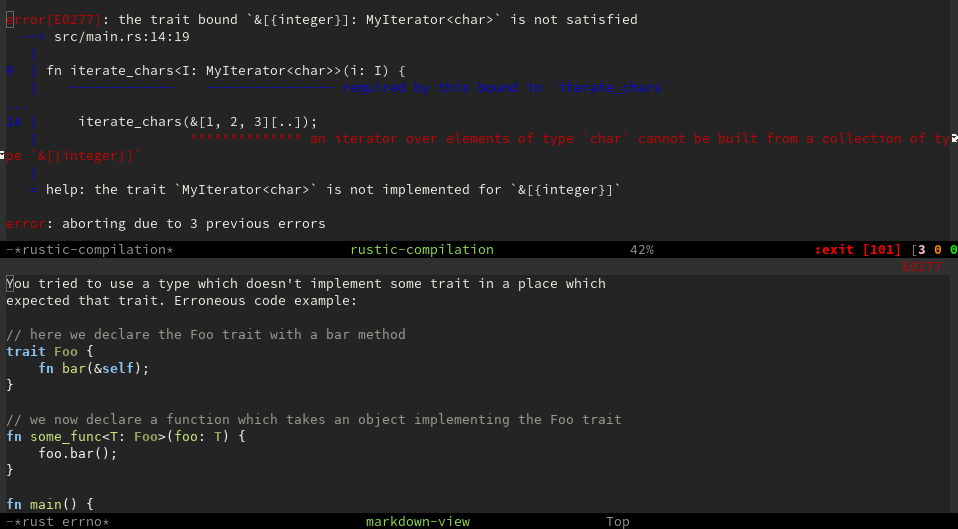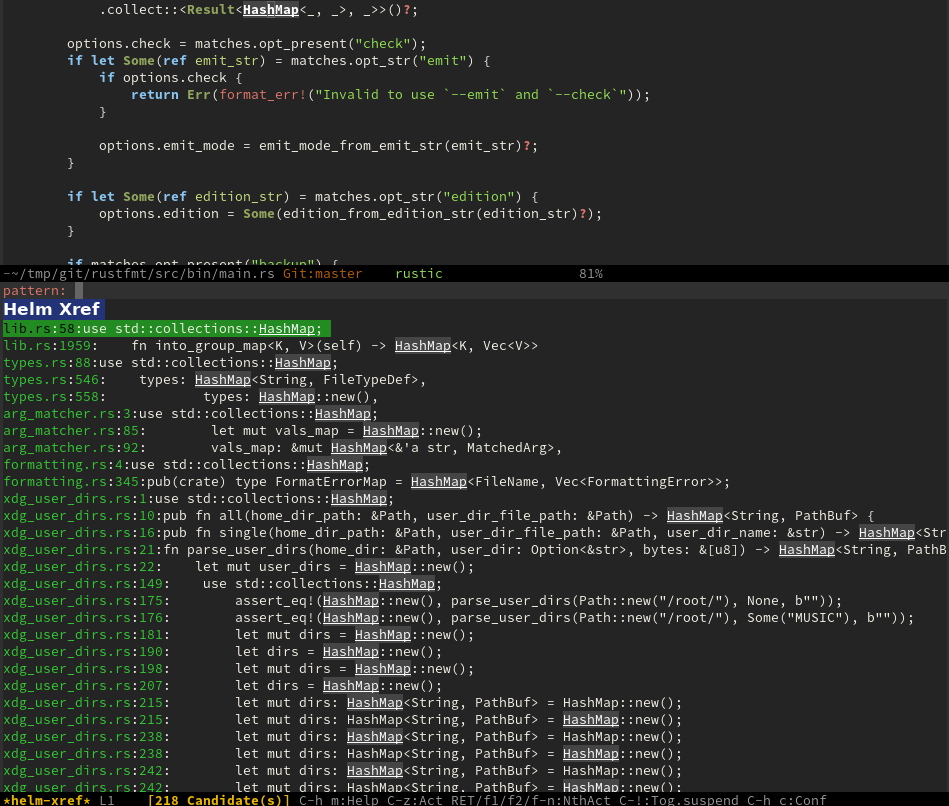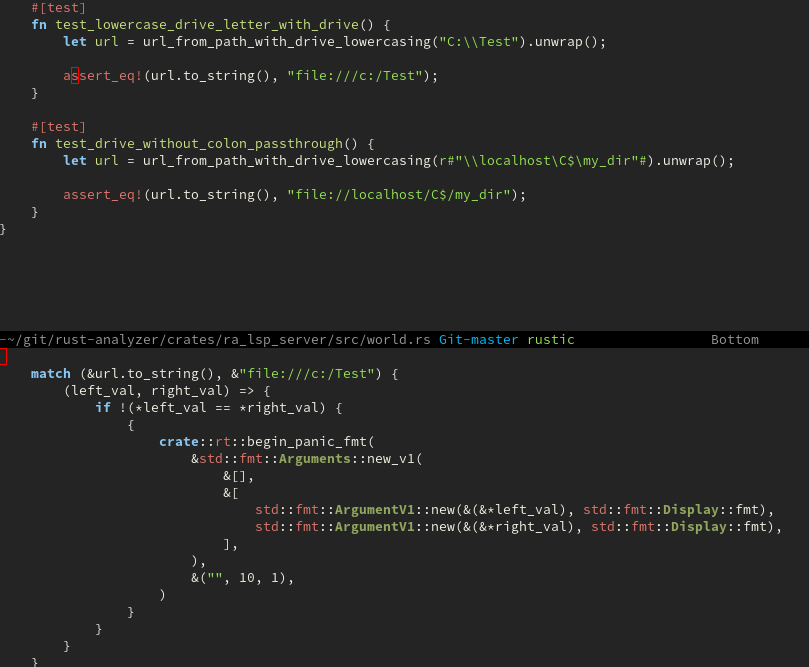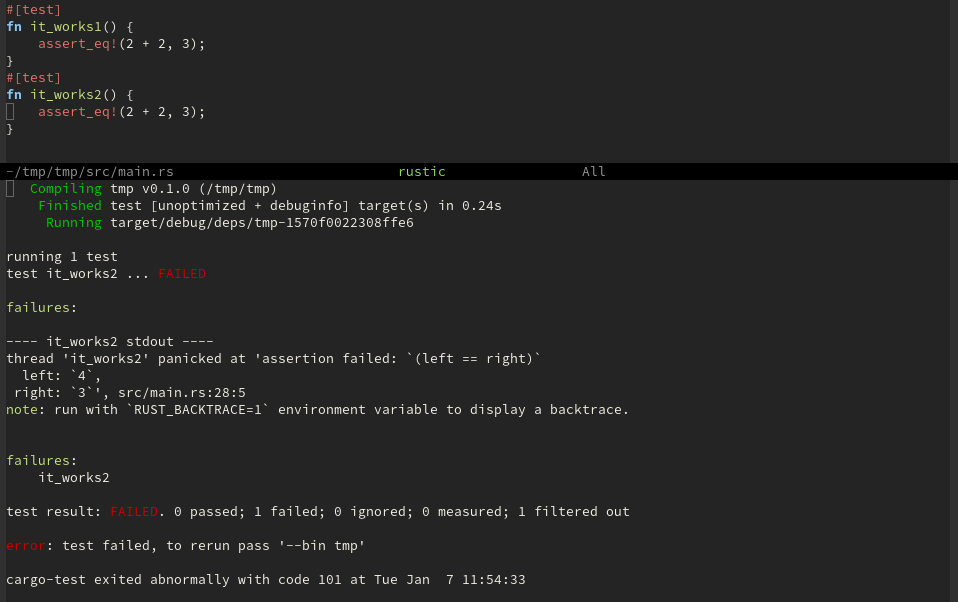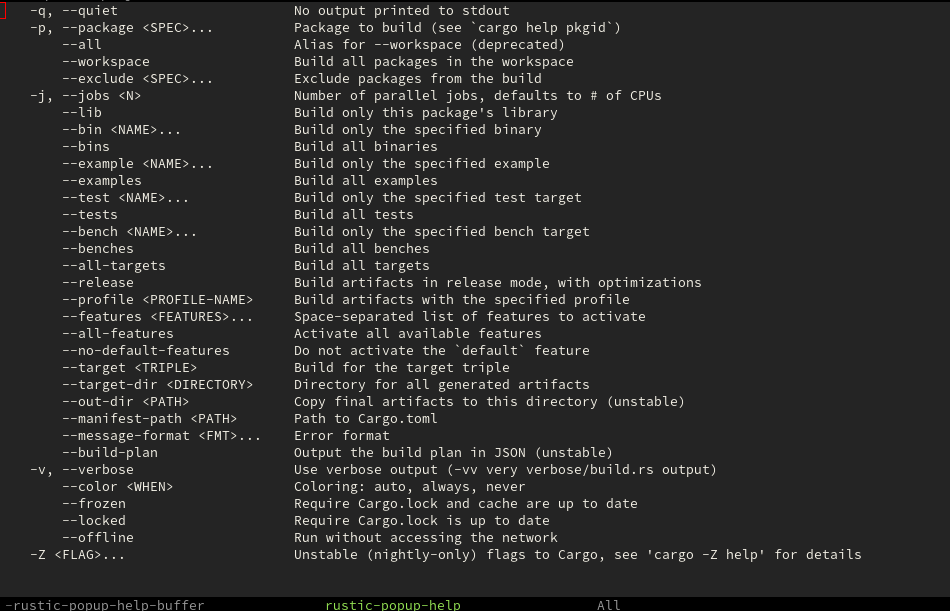Table of Contents
- Rustic
This package is a fork of rust-mode
Differences with rust-mode:
- flycheck integration
- cargo popup
- multiline error parsing
- translation of ANSI control sequences through xterm-color
- async org babel
- custom compilation process
- rustfmt errors in a rust compilation mode
- automatic LSP configuration with eglot or lsp-mode
- Optional rust inline documentation
- cask for testing
- requires emacs 26
- etc.
Why fork ?
Simply put (use-package rustic) in your config and most stuff gets
configured automatically.
(use-package)
It's necessary to include elpa for a package dependency:
(setq package-archives '(("melpa" . "http://melpa.org/packages/")
("gnu" . "http://elpa.gnu.org/packages/")))If ‘spinner-1.7.3’ is unavailable” when trying to install rustic, you need to update GPG keys used by the ELPA package manager. Try installing gnu-elpa-keyring-update.
If you have rust-mode installed, ensure it is required before rustic
since it has to be removed from auto-mode-alist. However you only
need rust-mode if you want to use emacs-racer. There's some stuff
that isn't included in rustic.
If you have any issues with rustic, please try running emacs without
rust-mode loaded.
If you can't run rust-analyzer or cargo can't be found, your environment variables probably don't work in emacs. Try exec-path-from-shell to fix this.
straight.el clones each of your packages directly from its source. There are good additional installation instructions for moving your package management from package.el to straight.
Rustic defines a derived compilation-mode. Colors can be customized
with several defcustoms. You can use next-error and
compilation-next-error as for any other compilation buffer.
However it's possible to also jump to line numbers that are displayed
at the beginning of a line. This feature is provided by a hook around
compile-goto-error(RET).
Commands:
rustic-compilecompile project usingrustic-compile-commandrustic-recompilerecompile usingcompilation-argumentsrustic-compile-send-inputsend string to process of current buffer
Customization:
rustic-compile-display-methodchoose function that displays the compilation bufferrustic-compile-backtracechange backtrace verbosityrustic-compile-commanddefault command for rust compilation
Supported compile.el variables:
- compilation-arguments
- compilation-scroll-output
The colors that are displayed in compilation buffers come from cargo
and are translated by xterm-color. You can change these colors by
modifying rustic-ansi-faces.
rustic-compilation-mode doesn't use the default faces of
compile.el. If you want to change these colors you can use something
similar to:
(custom-set-faces
'(rustic-compilation-column ((t (:inherit compilation-column-number))))
'(rustic-compilation-line ((t (:foreground "LimeGreen")))))Additional faces:
rustic-messagerustic-compilation-errorrustic-compilation-warningrustic-compilation-info
You can format your code with:
rustic-format-bufferformat buffer with stdinrustic-format-fileform file and revert bufferrustic-cargo-fmtrun cargo-fmt on workspace
Rustic uses the function rustic-save-some-buffers for saving buffers before
compilation. To save buffers automatically, you can change the value of
buffer-save-without-query. In case you prefer using lsp for
formatting, turn off rustic-format-on-save and set
rustic-lsp-formatto t.
Customization:
rustic-rustfmt-binpath to rustfmt executablerustic-rustfmt-config-alistalist of rustfmt configuration optionsrustic-format-display-methoddefault function used for displaying rustfmt buffer (use the functionignore, if you don't want the buffer to be displayed)rustic-format-trigger'on-saveformat buffer before saving'on-compilerun 'cargo fmt' before compilationnildon't format automatically
If you are struggling with errors relating to the rust edition in cargo.toml, this may in fact be a problem with rustfmt and its default settings. To solve this, even though the error message mentions cargo.toml, you you have to put edition = "2018" in a rustfmt.toml. See here for more info.
Disable LSP support by setting rustic-lsp-client to nil. You have to
restart emacs when you switch lsp clients.
rust-analyzer is the default and can be changed to rls. lsp-mode
related code was moved to the lsp-mode repo. rustic-lsp-server sets
the value of lsp-rust-server.
(setq rustic-lsp-server 'rls)Change rust-analyzer path.
(setq rustic-analyzer-command '("~/.cargo/bin/rust-analyzer"))The default package is lsp-mode. But you can also use eglot.
(setq rustic-lsp-client 'eglot)LSP commands:
xref-find-definitions
xref-find-references with helm and rust-analyzer
Turn off flymake.
(add-hook 'eglot--managed-mode-hook (lambda () (flymake-mode -1)))lsp-describe-thing-at-pointdisplay documentationlsp-find-definitionmakes use of xref
You can find more information in the lsp-mode wiki.
This command can be extremely convenient when applying code actions or using auto-imports.
Run lsp-execute-code-action when lsp-ui displays code actions at the
top of the sideline.
lsp-rust-analyzer-expand-macro expand macro call at point
recursively
The results are formatted and highlighted by default, but you can use
your own function by customizing
lsp-rust-analyzer-macro-expansion-method.
rust-analyzer does work over TRAMP, but you have to register the client
manually:
(with-eval-after-load "lsp-rust"
(lsp-register-client
(make-lsp-client
:new-connection (lsp-stdio-connection
(lambda ()
`(,(or (executable-find
(cl-first lsp-rust-analyzer-server-command))
(lsp-package-path 'rust-analyzer)
"rust-analyzer")
,@(cl-rest lsp-rust-analyzer-server-args))))
:remote? t
:major-modes '(rust-mode rustic-mode)
:initialization-options 'lsp-rust-analyzer--make-init-options
:notification-handlers (ht<-alist lsp-rust-notification-handlers)
:action-handlers (ht ("rust-analyzer.runSingle" #'lsp-rust--analyzer-run-single))
:library-folders-fn (lambda (_workspace) lsp-rust-library-directories)
:after-open-fn (lambda ()
(when lsp-rust-analyzer-server-display-inlay-hints
(lsp-rust-analyzer-inlay-hints-mode)))
:ignore-messages nil
:server-id 'rust-analyzer-remote)))If you have Emacs 28, due to some compatibility issues, you might have to additionally use:
(defun start-file-process-shell-command@around (start-file-process-shell-command name buffer &rest args)
"Start a program in a subprocess. Return the process object for it. Similar to `start-process-shell-command', but calls `start-file-process'."
;; On remote hosts, the local `shell-file-name' might be useless.
(let ((command (mapconcat 'identity args " ")))
(funcall start-file-process-shell-command name buffer command)))
(advice-add 'start-file-process-shell-command :around #'start-file-process-shell-command@around)(thanks to emacs-lsp/lsp-mode#2514 (comment))
You'll have to have rust-analyzer already installed on the target machine.
cargo-edit provides commands to edit your dependencies quickly.
The rustic commands can be called with prefix C-u if you want to modify the parameters of a command.
rustic-cargo-addAdd crate to Cargo.toml using 'cargo add'rustic-cargo-rmRemove crate from Cargo.toml using 'cargo rm'rustic-cargo-upgradeUpgrade dependencies as specified in the local manifest file using 'cargo upgrade'
rustic-cargo-test run 'cargo test', when called with C-u store
arguments in rustic-test-arguments
rustic-cargo-test-rerun rerun 'cargo test' with arguments stored in
rustic-test-arguments
rustic-cargo-current-test run test at point
Use rustic-cargo-outdated to get a list of dependencies that are out
of date. The results are displayed in tabulated-list-mode and you
can use most commands you know from the emacs package menu. This
option requires the rust package cargo-outdated to be installed
before being used.
umark single crate for upgradeUmark all upgradable cratesmremove markxperform marked package menu actionsrrefresh crate listqquit window
Currently cargo does not display the correct installation command for
some toolchains when clippy isn't installed. If you have problems try
it with rustup component add --toolchain nightly clippy.
Use rustic-cargo-clippy to view the results in a derived compilation
mode.
In case you want to see clippy lints with flycheck, you can activate
this checker and use the command flycheck-list-errors
(push 'rustic-clippy flycheck-checkers)Turn off flycheck.
(remove-hook 'rustic-mode-hook 'flycheck-mode)The parameters of the checker can be modified with rustic-flycheck-clippy-params
and are by default configured for using unstable options that are only available
on the nightly toolchains.
If you are using the stable toolchain you have to change the value:
(setq rustic-flycheck-clippy-params "--message-format=json")If you are using lsp-mode with rust-analyzer, you can set
lsp-rust-analyzer-cargo-watch-command to clippy instead of
activating the checker rustic-clippy.
Blocks run asynchronously and a running babel process is indicated by a spinner in the mode-line. It's possible to use crates in babel blocks.
Execute babel block with org-babel-execute-src-block
#+BEGIN_SRC rust :crates '((regex . "0.2"))
extern crate regex;
use regex::Regex;
fn main() {
let re = Regex::new(r"^\d{4}-\d{2}-\d{2}$").unwrap();
assert!(re.is_match("2014-01-01"));
}
#+END_SRC
If specific crate features are required then these can be specified
with the :features argument. Note that if it is just a single feature
then a string, instead of a list, will also be accepted:
#+BEGIN_SRC rust :crates '((tokio . 1.0)) :features '((tokio . ("rt-multi-thread" "time")))
extern crate tokio;
fn main() {
tokio::runtime::Runtime::new()
.unwrap()
.block_on(async {
tokio::time::sleep(tokio::time::Duration::from_millis(10)).await;
});
}
#+END_SRC
Supported org babel parameters:
Write to file :results file :file ~/babel-output
Customization:
rustic-babel-format-src-blockformat block after successful buildrustic-babel-display-compilation-bufferdisplay compilation buffer of babel process
In case you want to use a different spinner type you can modify rustic-spinner-type or turn it off completely with rustic-display-spinner.(Available spinner types).
With some setup, it is possible to read rust documentation inside Emacs! This currently requires LSP-mode.

- Install Pandoc https://pandoc.org/installing.html
- Install cargo https://doc.rust-lang.org/cargo/getting-started/installation.html
- Install helm-ag https://github.com/emacsorphanage/helm-ag (Optional, but highly recommended)
- If you do not have them, you will be prompted to install
fd-find,ripgrepandcargo-makedocswhen you runrustic-doc-setup.ripgrepis optional but highly recommended.- If helm-ag and ripgrep is installed, those will be used by default.
- If only ripgrep is installed, it will be used with the emacs
grepcommand. - If neither is installed, the emacs
grepcommand will usegrep, like in the good old days. - You can change this by providing your own search function by changing
rustic-doc-search-function.
- Enable
rustic-doc-mode. - Run
M-x rustic-doc-setupto download files that rustic-doc needs to convert rust documentation and also convertstd. - You can now convert package-specific documentation with
M-x rustic-doc-convert-current-package - Search the org files with
rustic-doc-search(bound toC-#by default) if you are inRust mode,Rustic modeorOrg mode. If you hover over a symbol when you invoke the command,rustic-doc-searchwill insert a default value. - Add
universal argumentto only search for level 1 headers like struct or enum names.
- We are waiting for an update to Pandoc that will make the generated documents prettier, it should be available soon jgm/pandoc#6554
- You should re-run
rustic-doc-setuponce in a while, to update the pandoc filter. - If rustic-doc does not find the documentation for something, the first thing to do is check the project's
target/docfolder for the corresponding.html-file. If there is no file there, there is nothing for rustic-doc to convert. If there is a file there, please create an issue!
You can execute commands with rustic-popup. The list of commands can be customized with rustic-popup-commands.
The command rustic-popup-default-action (RET or TAB) allows you to change:
RUST_BACKTRACEenvironment variablecompilation-argumentsforrecompile- arguments for
cargo test
View help buffer containing a command's flags with h:
To run the tests, you will need Cask.
cask exec ert-runnerPRs, feature requests and bug reports are very welcome.

